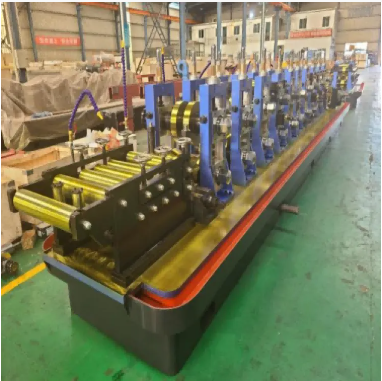Understanding Your Production Needs
Assessing Output Capacity Requirements
Getting a clear picture of what output capacity steel pipe making machines actually need is essential if manufacturers want to keep up with market demands without wasting resources. Start by looking at projected production volumes to figure out the right machine size for the job. Machines that match actual workloads maintain both quality standards and production speed without unnecessary strain on equipment. Looking ahead matters too. Many businesses end up stuck with outdated machinery simply because they didn't plan for future growth when making their initial investment decisions. Smart companies buy equipment that works today but leaves room for scaling up as customer demand grows over time. Another important step involves spotting where current operations hit roadblocks. Common bottlenecks often appear at welding stations or cutting units during peak production periods. Installing upgraded machinery at these critical points typically boosts throughput significantly while reducing downtime across the entire manufacturing process.
Determining Pipe Specifications (Diameter, Thickness)
Getting clear on what exactly your pipes need to do before picking out machinery makes all the difference in meeting production goals. Start looking at things like diameter and wall thickness requirements first since different applications call for completely different dimensions. Some jobs need thick walled pipes while others work fine with thinner ones, so knowing this upfront prevents headaches later when pipes don't perform as expected. Industry standards matter too because they set minimum safety thresholds across various sectors from oil pipelines to water distribution systems. Make sure whatever machine gets selected works well with fittings already in place throughout the facility. Otherwise, there might be problems connecting new pipes to old infrastructure down the road. Taking time to understand these details leads to better equipment choices that actually fit what's needed on site rather than generic solutions that fall short during actual operation.
Material Compatibility and Application
Types of Steel Supported by the Machine
Knowing what kinds of steel a particular machine works with makes all the difference when it comes to getting good results from production runs. Most shops work regularly with standard steels such as carbon steel and stainless steel varieties. These different materials have their own unique makeup and characteristics, so checking whether a machine can handle these differences becomes pretty important. What kind of steel goes into making pipes really affects how strong they are and how well they resist rust over time. Talking directly to equipment makers often pays off too, since they might suggest special steel options that perform better under certain conditions. Getting this right means machines stay flexible enough to tackle whatever production needs come along next month or next quarter.
Coating and Surface Treatment Requirements
Surface treatments and coatings play a big role in making steel pipes last longer and work better in different conditions. Take areas where there's lots of moisture for example, those usually need special coatings that resist rust so the pipes don't break down over time. Getting clear on what kind of surface treatment works best depends heavily on where exactly the pipes will end up being used. The way surfaces look matters too beyond just how they perform. A smooth finish makes all the difference when it comes to both appearance and how long things hold up. When looking at machinery options, checking if equipment can handle different types of coatings like galvanized finishes or powder coatings becomes really important. Machines that manage multiple coating methods while still producing good quality products tend to make or break whether production runs smoothly in real world settings.
Key Machine Features to Prioritize
Automation Level and Control Systems
The amount of automation in a steel pipe making machine matters a lot when making a purchase decision. Automated machines cut down on labor expenses while speeding things up across the production line. They require less hands-on work from operators and generally run faster than their manual counterparts. High end automated systems actually do wonders for process consistency too. They reduce mistakes made by workers and ultimately save money over time. Control panels matter just as much though. Operators need something they can program without getting frustrated. The best machines come with screens that make setting parameters straightforward even for new staff members. Don't forget about how well the equipment will fit into current factory setups either. Machines that plug right into existing workflows make a world of difference in day to day operations.
Precision Engineering for Consistent Quality
Getting precise engineering right makes all the difference when manufacturing quality steel pipes time after time. Anyone looking at pipe making equipment needs to pay close attention to models that actually apply precision engineering methods. Take CNC technology for instance Computer Numerical Control systems really boost consistency because they control every aspect of the manufacturing process down to tiny details, which cuts down on defects significantly. Checking what kind of tolerances a particular machine can handle matters a lot too. Machines capable of tighter tolerances generally produce pipes that perform much better under real world conditions. Beyond just quality control, precision work helps manufacturers meet those tough industry standards everyone keeps talking about these days. This ultimately raises the bar for production quality across the board.
Durability of Rollers and Forming Components
Roller and forming component durability matters a lot when selecting steel pipe making machines. These parts get put through the wringer during continuous production cycles and must hold up over time while maintaining their function. The quality of materials used makes all the difference here - cast iron versus hardened steel will show vastly different lifespans under industrial conditions. Manufacturers typically publish maintenance guidelines for these critical parts, so operators should check those recommendations closely to avoid unexpected breakdowns. Warranty coverage specifically addressing component wear is worth considering too, as many companies offer extended protection plans for exactly this reason. Machines built with durable components tend to stay productive longer between repairs, which translates directly into fewer production stoppages and lower overall costs throughout their service life.
Evaluating Manufacturer Credentials
Industry Experience and Technical Expertise
Looking at steel pipe making machine manufacturers really comes down to checking out how long they've been around and what kind of technical know-how they actually have. Manufacturers that stick around for years usually produce reliable stuff because they know what works in practice. Their reputation matters sure, but it's also about whether they keep up with new tech trends or just stick to old methods. Take a look at the qualifications on staff members' resumes too. Certifications matter a lot here since they show actual training behind those claims of expertise. Client testimonials are gold dust though. Real stories from people who bought machines last year tell volumes about day-to-day performance issues nobody mentions in brochures. Case studies help spot problems before they happen, which is why serious buyers always ask for them first thing.
After-Sales Support and Maintenance Services
After-sales support really matters for businesses investing in new equipment. When companies provide good training for their staff on how machines work and need regular maintenance, it makes all the difference in getting everything up and running smoothly alongside current operations. Spare parts also play a big role here. Without easy access to replacement components, even minor issues can turn into major headaches with machines sitting idle for days or weeks. Before making a purchase, smart managers always look at what kind of customer service they'll get. A fast response time and reliable technical help means problems get fixed quickly instead of dragging out production delays. Good maintenance services aren't just nice to have they're actually critical for keeping production going strong and cutting down those expensive repair bills over time.
Customization Capabilities for Unique Needs
When looking at manufacturing solutions, how much customization is possible really matters for companies with special production needs. Being able to tweak machines according to what actually works best on the factory floor often leads to better efficiency and greater flexibility overall. Before making any decisions, it pays to talk directly with manufacturers about what kind of changes they can realistically implement. Some might only offer minor tweaks while others have extensive modification programs. A good indicator comes from checking out who else they've customized equipment for in the past. Real world examples show whether these adjustments actually translate into machines that hit those production targets. Companies that find manufacturers willing to work around their specific constraints tend to stay ahead of market shifts because their operations aren't locked into one-size-fits-all solutions.
Cost-Efficiency Analysis
Initial Investment vs Long-Term Operational Costs
When looking at the financial side of getting a steel pipe making machine for business operations, there are several key considerations worth keeping in mind. A good cost benefit analysis helps compare what it takes to get started versus ongoing expenses like regular maintenance and replacement parts down the road. The process typically looks at things such as workforce requirements and how these stack up against what other companies in the sector are spending. Businesses should always balance upfront costs against what they'll spend maintaining the equipment over time, since this directly affects whether the purchase makes sense financially speaking. Looking at different models on the market while noting which ones tend to have fewer breakdowns or require less frequent servicing gives a better idea of what kind of money needs to be set aside for proper operation in the years ahead.
Energy Consumption and Waste Reduction Features
When looking at steel pipe manufacturing equipment, energy efficiency and waste reduction capabilities matter a lot for cutting down on running costs while also helping meet green targets. Take a closer look at what parts of these machines actually save power - this can cut electricity bills substantially in the long run and help factories stay on track with their sustainability promises. Waste management systems during production are another important factor worth checking out. Some manufacturers have really good setups that keep scrap materials to a minimum. For companies trying to align shop floor activities with broader corporate environmental policies, knowing how much waste a particular machine generates makes all the difference. Machines equipped with these kinds of features not only run better but also support ongoing green initiatives across different departments.
FAQ
What is the importance of assessing output capacity requirements?
Assessing output capacity requirements helps ensure that steel pipe making machines can meet current production demands efficiently and adapt to future growth.
Why are specific pipe specifications crucial?
Specific pipe specifications like diameter and thickness are vital for selecting machines that produce pipes meeting application needs and industry compliance.
How does automation influence steel pipe production?
Automation reduces labor costs, increases production efficiency, and enhances operational speed by minimizing manual intervention.
What should be considered in precision engineering?
Precision engineering ensures consistent high-quality pipe production by employing technologies like CNC for accurate manufacturing processes.
Why is after-sales support important?
Robust after-sales support, including training and spare parts availability, ensures seamless machine integration and maintenance.

